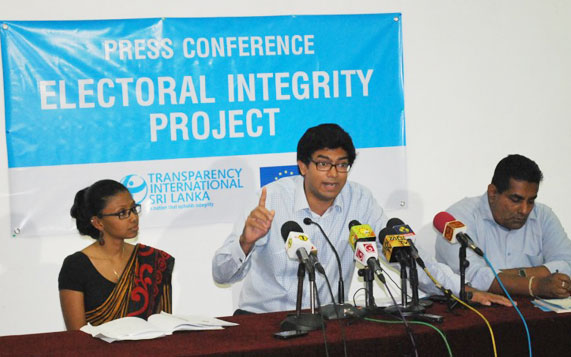Transparency International Sri Lanka conducted a press conference on 25th January 2016 under the project titled to Ensuring Electoral Integrity in the Electoral Process through Independent Election Observation and Remedial Action to communicate key messages about the declaration of assets and liabilities act, the forthcoming Local Government Elections and the need for regulating campaign expenditure. As an organization that advocates for the amendment of the existing law the governs the declaration of assets and liabilities of elected representatives, TISL highlighted the restrictive provisions in the existing Act that prevents citizens from publicizing the content of a declaration that they had obtained through legal means. TISL together with the Commission to Investigate Allegations of Bribery or Corruption (CIABOC) developed and handed over a set of amendments to the President on 9th December 2015, commemorating the International Anti-Corruption Day, seeking a revision to the existing law in order to make it more effective. TISL shared with the media personnel a copy of the set of Amendments handed over to the President for wider dissemination.
Furthermore TISL expressed its concern over the provision in the Local Authorities Elections (Amendment) Act, No.22 of 2013 regarding the requirement for an independent group to handover a legal tender of Rs. 20,000 for each candidate as opposed to the Rs. 5000 legal tender required by a candidate contesting from a political party. One of the benefits of a mixed system of FPTP and PR is that it enables any person to run for office. However provisions such as this forces candidates to think along party lines than come forward as an independent candidate. The quota system proposed by the Bill to amend Chapter 262 of the Local Authorities Elections Ordinance was also mentioned by TISL. While TISL commended the bill as a positive move from the government to finally introduce a quota system to increase female representation, the way in which it will be implemented is still unclear. Also TISL questions the need to increase the number of members to accommodate female candidates.
TISL also discussed the need for policies that will regulate campaign expenditure of candidates and proposed that a campaign expenditure ceiling or at least the submission of a registrar of donation be made compulsory for candidates and political parties. It is a well-known fact that candidates spend large amounts of money for their campaigns often using State resources as well as their own private funds. This has resulted in a number of issues ranging from vote buying to creating an unequal playing field for good candidates that might have limited resources. This issue will only increase during the upcoming local government election as candidates who formerly used their resources to win an entire local government area will now use it to win a single ward as there is no prize for coming 2nd. It is important that the government and political parties look into regulating campaign expenditure ceiling to create a more equal playing field for candidates.

